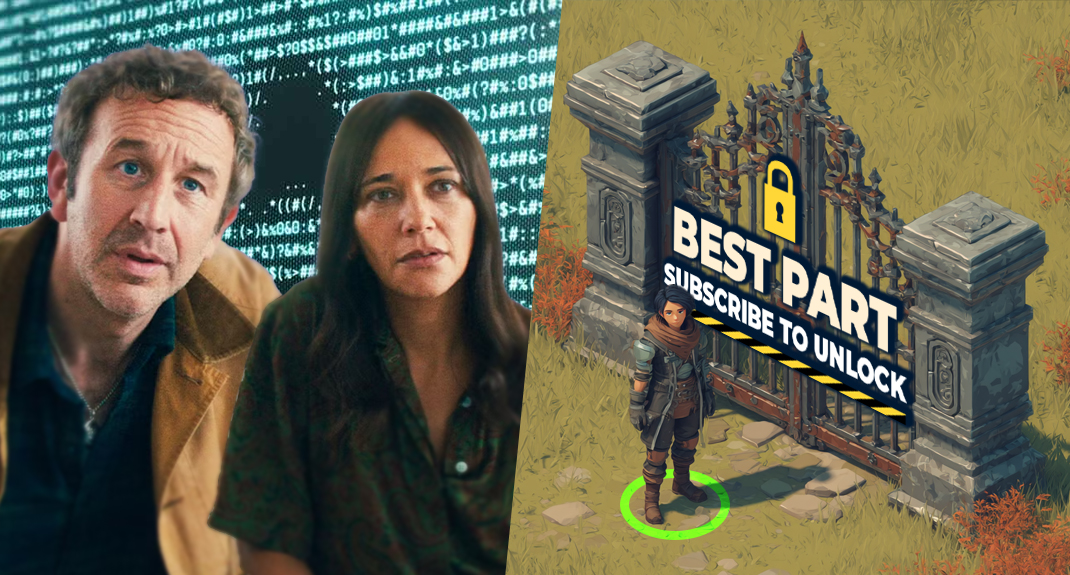- Newsroom
- >
- Black Mirror and the Gaming Industry: A Mirror to Monetization

May 06, 2025
By Nick Woodford
Topics:
Black Mirror and the Gaming Industry: A Mirror to Monetization
Reflecting the Mood: Black Mirror’s Cultural Commentary
Black Mirror, the science fiction series created by Charlie Brooker, explores dark, often dystopian themes related to technology. These themes often reflect the nation's mood, especially within the UK, capturing anxieties around technology, society, politics, and media.
For example, Season 1’s “The National Anthem” was released in the wake of the News Of The World hacking scandal in the UK. The episode covered themes of public disgust and fascination with how the media manipulates perception and power.
Season 3’s “Nosedive” captured the growing discomfort with the performative nature of digital life, released around the rise of Instagram influencers and high social media anxiety. More recently, Season 6’s “Joan Is Awful” premiered during the rise of generative AI and deepfakes, satirizing personalized media and our surrender of identity rights to streaming platforms.
The latest season continues this trend, delving into themes like AI, digital consciousness, and the societal impact of advancing technology. Notably, two episodes leaned heavily into ongoing debates in the gaming industry around monetization.
From Screens to Subscriptions: Gaming’s Monetization Problem
The first episode of the series, “Common People”, dramatizes real-world frustrations with subscription fatigue. In the story, a life-saving medical technology is only available through a costly monthly subscription. Even survival is commodified—a chilling metaphor for the increasing trend of locking game content and functionality behind recurring payments.
Some viewers have reported feeling unsettled and even compelled to cancel their own subscriptions after watching. This Reddit thread provides an interesting insight into the frustration people felt after watching, and the forwing fatigue with this monetization method.

Estimated average number of subscriptions for Americans based on available data and industry growth trends from Perplexity
With so many services vying for consumer attention, it’s no wonder people feel overwhelmed. In gaming, the picture is even more complex due to the wide range of subscription types and overlapping content offerings.
Unlike TV and film streaming services, where content tends to be exclusive, many gaming platforms offer overlapping libraries. This becomes especially confusing for players who own multiple devices.

Minecraft’s Multi-Platform Confusion
A prime example of subscription overlap is Minecraft. If you’d just gone out and watched the Minecraft movie and decided you wanted to give the game a go, you could access it on:
- Xbox Game Pass (console & PC, Bedrock & Java included)
- PlayStation (must purchase separately; PlayStation Plus needed for online)
- Nintendo Switch (purchase required; Switch Online needed for multiplayer)
- NVIDIA GeForce NOW (stream if you own the game)
- PC (purchase Java or Bedrock editions directly)
- Mobile (purchase Bedrock on iOS/Android)
- VR (via compatible apps on headsets like Meta Quest)
Minecraft also has its own subscription, Minecraft Realms, for private servers and community content. Other in-game subscriptions, like Fortnite Crew, Call of Duty Battle Pass, and Roblox Premium, add yet another layer of subscriptions for players.
The "Common People" episode highlights how services introduce new tiers over time, often removing features from base tiers to push users toward more expensive options. With publishers acting more like media companies and game production costs rising, consumers may bear the financial burden of these evolving business models.
As Joost Van Dreunen explained on Anzu’s Ad Ventures series: “Game publishers used to express themselves in units sold, and nowadays they talk about how many people they reach through their player network. For example, EA will say it can now reach X million players across their sims and sports titles - these game publishers are talking more and more like media companies, which is a sign of where we’re headed”.
Pay-to-Win Fallout: Real Games, Real Backlash
The final episode of the season offered perhaps the sharpest critique of the gaming industry. It centered around a corporation that runs a pay-to-win game where wealthy players can thrive while others struggle to survive. The metaphor was clear: monetization in gaming often creates imbalance.
Several real-world games have faced similar criticism:
- Diablo Immortal: Slammed for pay-to-win mechanics.
- MapleStory: Faced legal action in South Korea over deceptive practices.
- Game of War: Known for heavy spending incentives affecting balance.
Some studios have pivoted in response to community backlash. For example, Clash of Clans has adjusted its model so that free-to-play users can still progress. Most purchases are now cosmetic or convenience-based.
I won’t spoil the episode by revealing whether the studio ultimately changes its approach, but the narrative leaves viewers questioning the sustainability and ethics of aggressive monetization strategies.
What It Means for Developers and Advertisers
Monetization remains a divisive topic in gaming. The themes from Black Mirror underscore the trade-offs of different models. Rising development costs and increasing competition mean developers must make difficult choices. Many are adopting hybrid approaches to ensure sustainable revenue.
What works for one game may not work for another. Developers must consider their player base, genre, and long-term engagement goals when selecting monetization strategies. For advertisers, understanding these models is crucial to aligning with games in ways that respect the player experience and maximize engagement.
Final Thoughts
As gaming and media continue to converge, and monetization strategies evolve, it’s more important than ever to meet players where they are, without compromising their experience. At Anzu, we believe intrinsic in-game ads offer a balanced path forward, supporting developers while delivering value to players and advertisers alike.

Nick is Anzu's Content Lead. As a gamer with a background in AdTech, he has a unique perspective on the industry and the in-game advertising sector.
